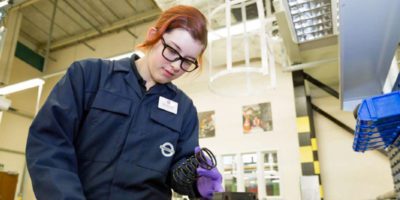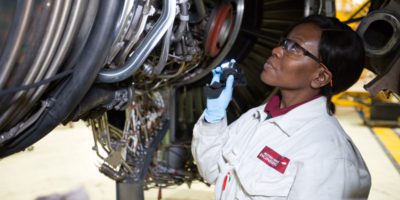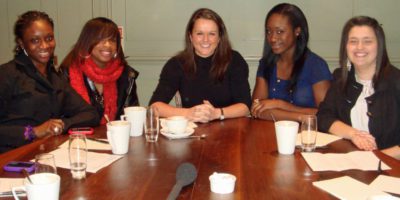Ella Ellisdon is a materials laboratory test engineer on the apprenticeship scheme at Airbus Defence and Space in Stevenage, where she works on Europe’s first rover mission to Mars – the ExoMars mission. In 2012 Ella joined the space engineering company, Astrium, manufacturing subsidiary of Airbus, which subsequently changed its name to Airbus Defence and Space. She has acquired her Level 2 and Level 3 NQVs (National Vocational Qualifications) at Highbury College in Portsmouth, in addition to her HNC (Higher National Certificate) Level 4, alongside gaining hands-on experience in the business.

“…It would be silly to say there are no challenges faced by women in a male dominated industry. I have come up against some challenges … but … I had great support from the company who dealt with the issues and I also became a lot stronger as a woman…”
Combining my love of maths and science through a modern apprenticeship
I was coming up to the end of my A-levels and all the teachers at school were pushing us to apply for degrees, I was very much undecided, plus the university fees had just tripled for my year of entry.
At the time I was working for Halfords part time as a bike mechanic and absolutely loved the hands on job of fixing things. At school, I had loved maths and science, but to be honest I had no idea what jobs I could do which would incorporate them. So I went to my school’s career advice centre and they told me about a career fair.
As the school only pushed for students to go to university afterwards I had no idea of the modern apprenticeships available. So I went to this careers fair, and Airbus (Astrium at the time) was there. I didn’t have a clue what engineering was before I spoke to the Airbus employee behind the stand, but he asked about my interests and told me engineering was a mixture of maths, science and hands on experience. He was so enthusiastic I went home that night and researched all about it.
I applied for university as well as the Airbus apprenticeship. I was really lucky and I got accepted on to both so had to make a decision. I am so glad I picked Airbus. It has developed me as a person, more than I think university would have. I got real hands on experience which is so valuable in this industry. I don’t think university can really compare to that in the same way. I also gained lots of qualifications.
Testing materials to breaking point
My role at Airbus is a materials laboratory test engineer. What I love about my job is I don’t have a typical day at work; no two days are the same. My overall job is to test materials to check that they are space worthy and will be able to withstand the conditions in space.
I test metals and carbons mechanically to destruction to figure out their fail loads and why they broke. I chemically analyse materials for certain qualities or finishes on a material’s surface. I outgas materials [release gas that was dissolved, trapped, frozen or absorbed] so that we don’t put any materials into orbit which could break down under vacuum or extreme temperatures. Contamination control and monitoring is also a big part of the materials lab job.
My apprenticeship structure
My apprenticeship is structured over three years and is split between the Airbus site in Stevenage and Highbury College in Portsmouth. In the first year you are in college full time, studying for BTEC Level 3 in Engineering and NVQ Level 2 Diploma in Performing Engineering Operations, so you have to move down to college.
This wasn’t college part time hours though; you are in lessons from Monday to Friday 9am until 5pm. Assignments are not completed in this college time, so after 5pm you are working to complete assignments by certain deadlines. However this first year was fantastic, I got to move away from home, have all my tuition fees paid for me, as well as my accommodation and earning a wage on top of that!
During the 2nd and 3rd year you are split between working on site for ten weeks and then going back to college for five weeks to study for your HNC [Higher National Certificate] Level 4 in Mechanical Engineering. Doing block release was a huge advantage to me. It allows you to see how everything you learn at your desk in college can be applied to real life work.
Experiencing many types of engineering
Each ten week block at work is in a different placement around the company. I think this is really beneficial as it allows you to experience many types of engineering, and figure out what you enjoy the most. I don’t think a lot of people get this experience without being able to do the apprenticeship. You might think you know what you are going to enjoy but sometimes you find something that you never thought you would.
One of my placements was with the Integrated Production team. I never thought I would enjoy working with engineering computer programmes as I thought I hated the idea of a desk job. However, this was one of my favourite placements and I am now in contact with them helping to install their more recent engineering programme into the materials laboratory for us to use.
Another major benefit of learning with an apprenticeship and experiencing all the different departments [in Airbus Defence and Space] is that you get an understanding of the overall production of a satellite. This understanding is so valuable, as you get an understanding of the limits each department is capable of when you need work completing by them.
Making contacts in other departments is another major benefit – these contacts have helped me through my apprenticeship, sharing knowledge and teaching me things that cannot be learnt in a text book.
Being supported without being treated differently
I found Airbus very supportive whilst I have been in my engineering role. However, I don’t feel like I have been treated any differently to any of my other colleagues.
I had regular meetings about my progress and feedback sessions where I could raise any issues with my department manager, apprenticeship manager and HR business partner. I had a good relationship with my manager so there wasn’t a time where I couldn’t schedule a meeting and discuss anything I needed to.
Becoming stronger and proving the doubters wrong
It would be silly to say there are no challenges faced by women in a male dominated industry. I have come up against some challenges – at the start of my career and I found this really tough. Moving away from home and not knowing anyone is hard enough, but doing it in a male dominated group (I was the only girl in my apprentice year) was a lonely experience.
A few incidents occurred; this wasn’t down to Airbus as a company, but due to the male dominated work involved. I had great support from the company who dealt with the issues and I also became a lot stronger as a woman. Challenges are going to occur in every job you are in – personalities clash. Being the minority can be used against you as it is an easy target, however, I have just used this to spur myself on and continue to prove wrong people who doubt me.
A growing number of apprenticeship opportunities
My advice would be that the Internet is a powerful tool. When I was at school there wasn’t anyone showing me what careers were out there, I had to go and find them. Going along to career fairs or contacting the local STEM co-ordinator can help you find out more information.
Schools can arrange for tours around our site, and there are usually events being held all over the country by Airbus. As apprenticeships are currently becoming more popular for companies to invest in, there are going to be more opportunities. Searching in your local area for events or arranging for work experience on site will really help you find out more if it for you.
Spreading the word about pioneering European work and creating more female (and male) role models
Tim Peake is a fantastic role model for the UK for both males and females, and I think that the UK sells itself short. NASA are fantastic at promoting themselves, and our space governing body, the ESA [the European Space Agency], needs to keep promoting all the fantastic, pioneering work it is doing right on the UK’s doorstep. As this happens I think we will see more female (and male) role models for everyone!
Locally I volunteer myself to go into school career fairs days and talk about our apprenticeship that we offer. I think that if younger females can see that there are females within engineering, and they are doing well, that they will be more inclined to join.
Having more coverage of successful women will help to inspire more up and coming female engineers. This is why I always try and volunteer to do extra-curricular events, past my day to day job, because inspiring more women into engineering and other fields of male dominated industry is very important to me.
What is coming up next for you and Airbus?
Coming up next for Airbus Defence and Space will be the kick-off of the Mars rover mission. As this is a new project for Airbus to be undergoing there is plenty of new material research work coming my way to test!
Coming up next for me is to complete the two year fast track scheme, which is how I achieve my training goals every six months. This will get me up to speed with all the other engineers in my department who have quite a few more years’ experience on me.
https://airbusdefenceandspace.com/
https://www.linkedin.com/company/airbus-defence-and-space
https://www.youtube.com/user/airbusds





